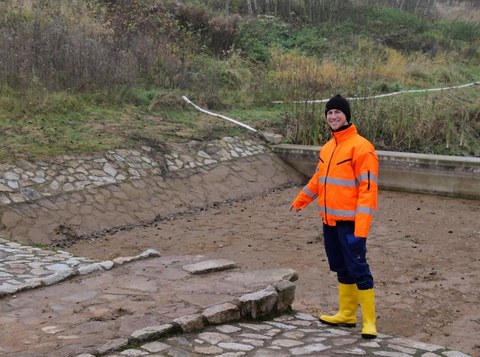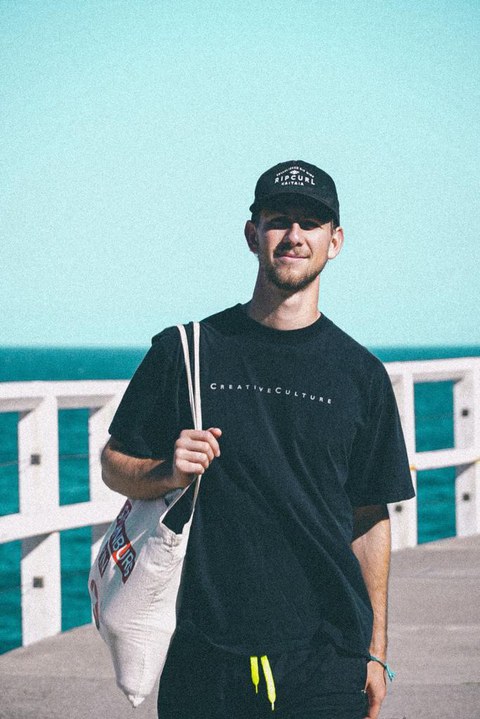"I looked for international degree programs because I wanted to keep the option open to work abroad with a Master's degree."
(surveyed in 2024)
Table of contents
- Why did you choose this degree program and why Dresden?
- Where do you work today and what is your job?
- What does a typical working day look like for you in three sentences?
- How did the start of your career go for you? When did you know which area you wanted to work in?
- How did you like your studies and how will they help you in your professional life?
- A degree course or professional career is rarely straightforward: what crises or hurdles did you face and how did you overcome them?
- What advice would you give students of your subject from today's perspective?
- What do you particularly remember about your time at university?
- You can't have studied in Dresden without...
| Profile of: | Niclas Einert |
| Degree program: | Hydro Science and Engineering |
| Degree: | Master |
| Period of study: | 4 semesters (2020-2022) |
| Current activity: |
Student, Master of Marine and Antarctic Sciences (postgraduate studies, DAAD scholarship) 2021-2023: Subject area manager for the remediation of industrial settling ponds |
Why did you choose this degree program and why Dresden?
I completed a semester abroad during my Bachelor's degree and wanted to keep the option open to work abroad with my Master's degree. That's why I looked for English-language/international degree programs. The profile of the "Hydro Science and Engineering" (HSE) Master's course appealed to me and some of my friends had already studied in Dresden, so it was an easy choice.
Where do you work today and what is your job?
I am currently studying for a second Master's degree in Marine and Antarctic Sciences, specializing in marine biology in Hobart, Australia.
Before that, however, I was employed at Wismut GmbH for two years, one year as a working student (during my 3rd and 4th semester) and two years full-time (from 09/2021 to 08/2023). I was responsible for the remediation of industrial tailings management facilities.
In this position, I developed engineering services and technical plans and was involved in carrying out hydrological-hydrogeological field work. Water law permit applications were also part of my responsibilities.
I will refer to my time at Wismut GmbH when answering the following questions.
What does a typical working day look like for you in three sentences?
I was lucky enough to be able to work flexitime and was usually in the office around 07:00 so that I could work on current projects/planning in the morning. Between 09:00 and 12:00, I was often either in the field, in video conferences or in personal discussions with colleagues (draftsmen/modelers, planners from other departments, group or department heads). In the afternoon, the things discussed with colleagues were then implemented or the field work was processed.
How did the start of your career go for you? When did you know which area you wanted to work in?
It was very easy for me to start my career. I had already completed an internship at Wismut GmbH during my bachelor's degree and kept an eye on the company's job advertisements during my master's degree. When a position was advertised that was suitable for me, I applied and was initially hired as a working student. My contract was for a fixed term of 4 years. I was able to keep my job after completing my studies and then worked full-time.
How did you like your studies and how will they help you in your professional life?
The course was very varied and interesting. The "mindset" and approaches to problem solving that you learn during your studies have helped the most in my career.
A degree course or professional career is rarely straightforward: what crises or hurdles did you face and how did you overcome them?
I would say Corona was the biggest hurdle during my studies... Especially the first semester (2020/2021) was stressful. I'm very grateful that I lived with a good friend who also studied with me. We definitely supported and motivated each other well.
What advice would you give students of your subject from today's perspective?
Do internships, take part in conferences and make contacts inside and outside of your studies. Vitamin B is the be-all and end-all in professional life and having a goal/plan for afterwards makes studying easier.
What do you particularly remember about your time at university?
The long summer evenings on the Elbe, the Tolerade and the cooking evenings with my international fellow students.
You can't have studied in Dresden without...
partying in the industrial area.


